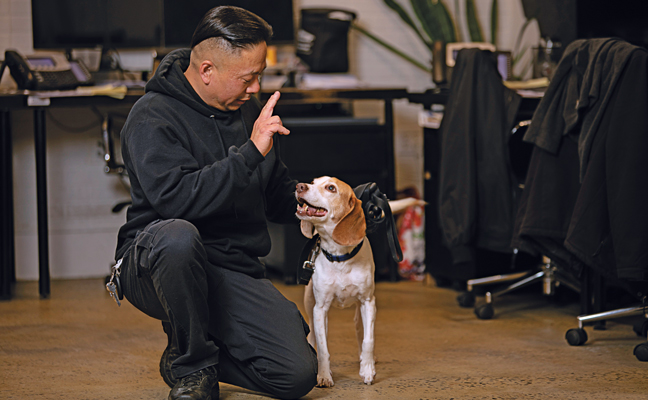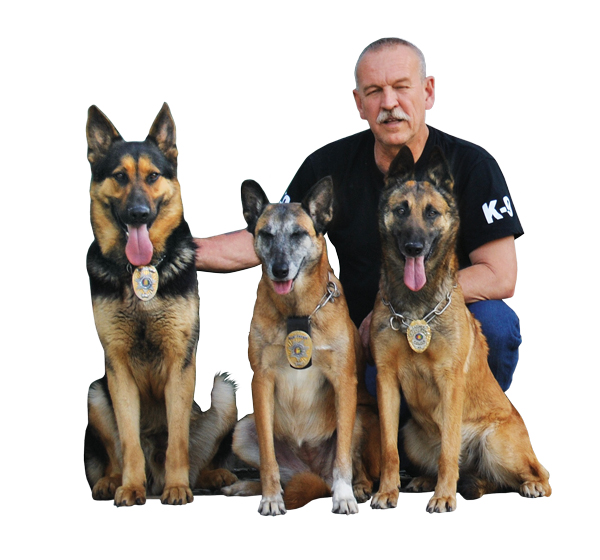
MMPC canine handler Herbie Yan gives a signal to his partner, Dexter. PHOTO: ROB TANNENBAUM PHOTOGRAPHY
Timothy Wong clearly remembers the day his world turned upside down.
It was June 11, 2020, and Wong, the founder and president of M&M Environmental Services (doing business as M&M Pest Control, or MMPC) in Queens, N.Y., already was feeling the effects the COVID-19 pandemic put upon his business. Because of his precarious financial situation, he had to furlough several employees in mid-March 2020, and now one of those employees made a decision that would affect MMPC’s reputation greatly.
Canine bed bug inspection handler Barry Myrick, who had been with MMPC for nearly five years, had signed a document upon hire noting he would surrender the dog he handled should he no longer work for the company. Originally, Myrick asked for two weeks off due to the pandemic, but changed his mind and requested to be furloughed after the Coronavirus Aid, Relief, and Economic Security (CARES) Act was signed into law on March 25, 2020, providing him an additional $600 a week in pandemic unemployment assistance on top of regular unemployment benefits, according to his email correspondence with MPPC.
Myrick told MMPC he felt uncomfortable working during the pandemic, which Wong said was reasonable. MMPC’s management team also agreed that Myrick could keep the canine, Roxy, as she was already with Myrick and had her food, grooming tools and other supplies with him. Wong realized this was a mistake on June 11.
As MMPC explains on its website homepage, in a message specifically responding to media coverage of what happened next:
After he emailed us his negative COVID test result, as is required before coming back to work, Mr. Myrick agreed to return to work on June 11th and to pick up his uniform, vehicles, and supplies. But on that day, Mr. Myrick informed us that he had already permanently moved from Brooklyn to Philadelphia, taking Roxy with him, which made it difficult for him to work for us in New York City. In an effort to keep him together with Roxy, we tried to find ways for him to continue working for us. But when we asked Mr. Myrick to return to the office for a follow up meeting on June 15th to explore the possibilities, Mr. Myrick did not show up and instead emailed us on June 22nd confirming that he had permanently relocated and decided to end his relationship with our company.
After that, Mr. Myrick disappeared. He refused to respond to our repeated calls, emails, texts and letters.
Pest Management Professional (PMP) reached out to Myrick, but did not receive comment by press time. In media accounts, however, Myrick says he was told to return the company vehicle, credit cards and equipment, but not Roxy. He alleges the company forfeited its claim when it did not request the dog.
When the case went to the New York trial court in December 2020, Judge Paul Goetz made media headlines worldwide with his decision: He sided with Myrick, citing divorce custody cases in which it would be in the best interest of the animal to be with the party with which it currently resides. Public sentiment seemed to agree, and MMPC was inundated with negative publicity. Yet MMPC had already spent more than $50,000 to acquire and train Roxy and her handlers.

Timothy Wong
“I’d like to make it clear that we had no choice but to take legal action to protect Roxy and our other dogs,” Wong points out. “If we didn’t, there would be nothing we can do to stop future canine handlers from doing the same thing as Mr. Myrick and disappearing with our other dogs. Depending on the judge’s final ruling, this could unfortunately become a legal precedent.”
At press time, Wong noted that MMPC and Myrick were in discussions “about hopefully reaching a reasonable and fair resolution to all of this.”
“We’ve tried to minimize the negative effects on business as much as possible,” Wong adds. “That said, we have received a number of calls and emails from some very emotional people, many from other states, in response to the sensationalized negative press. Many of them we were able to reason with once all of the facts were presented.”
AVOIDING NEGATIVE OUTCOMES

PHOTO: FSI K9
In many respects, the pandemic has thrown into unexplored territory a lot of situations that otherwise would have been open-and-shut cases, a gray area where emotions run high and the future is uncertain.
David Latimer, founder of the World Detector Dog Organization (WDDO) and owner of FSI K9, Vincent, Ala., has worked with and trained dogs for law enforcement and scent detection of bed bugs and termites. He says this is not an isolated situation, but perhaps it has gone further than most in the courts.
While the cases Latimer has been involved with were, seemingly as in the Myrick case, a matter of the canine handler bonding so closely with the dog that he or she did not want to relinquish it, he cautions that both dog and handler easily could become a competitor — especially without a non-compete agreement in place.
“A reasonable person would say, I’d really like to keep the dog, could we work something out,” Latimer says, noting he is speaking as an outsider on this particular case. “But leaving the state with your employer’s working canine could be considered fraud, larceny or even theft by deception. If you left with a company vehicle, law enforcement is going to come for that bought-and-paid-for company asset. This really isn’t that different.”
COMPENSATING HANDLERS

Dr. Sandy Seay
Dr. Sandy Seay is owner of Orlando, Fla.-based Seay Management, which is the official human resources provider for the National Pest Management Association. He notes that, when paying a canine handler who houses the dog during non-work hours, make compensation for dog-related needs such as toys, food and veterinarian expenses separate from the handler’s paycheck.
“Provide a supplement or stipend, because that makes the argument of who has possession of the dog stronger,” Dr. Seay says. “It helps establish that the dog is property of the company.”
It’s important to know the labor laws in the markets in which you operate. Local or state law might require a pest control company to provide one-half hour of pay per day per dog if the dog is cared for at the handler’s home.
“The law doesn’t allow for any waiver on the handler’s part,” says Scott Mullaney, co-owner of Woodbridge, Va.-based Unique Pest Management, which offers rodent scent detection and abatement services. “Any costs associated with the care of the dog at the employee’s home also must be paid by the employer. If these rules aren’t followed, the opening for a claim may be valid.”
In some states, like Virginia, Mullaney adds, dogs are classified as livestock, “which provides easier avenues to reclaim a dog.”

Scott Mullaney
Dr. Seay also recommends strengthening any upon-hire document, which should be, if not written by your attorney, at least reviewed and approved by one. “It should say ‘When and if the employee leaves, he or she must give up the dog within 24 hours,’” he says.
Dr. Seay’s final recommendation is to add a page to your existing employee handbook. “When someone leaves, you can get in just as much trouble being too good to people than not,” he laments, noting that’s especially true during the pandemic, where your instinct might be to be more lenient. “When a canine handler leaves, it’s important that the management team knows what they should and should not say.”
Saying “I wish you could keep her, but you can’t” is not good form, no matter how much you might mean it, he offers as an example. In fact, having a termination checklist in place for management, with scripts on what they might be able to say to the person they are letting go, is crucial. Dr. Seay notes that no one can anticipate every situation, of course, but the more bases you cover, the better off you are.
MAKING INSURANCE CLAIMS

Frank MacDonald PHOTO: SELECT INSURANCE
Insurance-wise, it’s best to call your provider before you get too far into planning for canine services, and see whether your carrier even offers coverage. “It can be a relatively inexpensive policy,” says Frank MacDonald, president of Select Insurance Agency, Scarsdale, N.Y., “but usually it’s in relation to canine mortality only.”
In other words, payout only occurs if the dog dies and is less than 7 years old, he says. Theft of, or injury to, the dog is not covered in most cases.
Andy McGinty, CEO of Baton Rouge, La.-based LIPCA Insurance, agrees. And as far as the working dog doing damage to property — or worse, biting a client — such claims are few and far between because of the intensive training dogs undergo.

Andy McGinty
Rather, McGinty says, “The claims we are starting to see are what we refer to as ‘full-service’ claims, with multiple PMP defendants being put on notice of the claim or named in the lawsuit. The easiest example is the pest company that offers integrated pest management and/or dry heat bed bug services, but also subs out the canine teamwork to another company. The plaintiff’s attorney will find out all companies involved through discovery, and all providing services at the location eventually will be involved.”
To combat such a situation, he says, pest control companies should have thorough inspection documents. “The one inspection document we have for our insureds is brutal,” McGinty says. “It should read like a wood-destroying insect/organism inspection document, but with stronger language regarding inaccessible areas, biological habits and characteristics of bed bugs. There should be language about any obstacles that would impede a thorough inspection of the structure. Do not be misled by a property or housing manager who asks you to use a weaker form, because you can get burned.”
DEDUCTING COSTS

Dan Gordon, CPA
For a financial point of view, PMP turned to its “The Bottom Line” columnist, Dan Gordon, CPA. Gordon, owner of PCO Bookkeepers in Newton, N.J., says the IRS doesn’t make any provisions for working dogs. “The closest we get is a depreciable racehorse,” he quips. While expenses like veterinarian bills, food, etc., are tax-deductible as business expenses, Gordon strongly recommends getting specific tax advice from your accountant.
As far as budgeting goes, though, he advises viewing the dogs almost as you would a vehicle — and then some. There is the initial cost of purchasing and training the pest scent detection dog, and then ongoing care expenses throughout the year. You could put some of the cost into your marketing budget line if you plan to use the dogs in your advertising materials — making live appearances at local home and garden shows, for example.
LESSONS LEARNED

MMPC working canine Dexter inspects a couch for bed bugs. PHOTO: ROB TANNENBAUM PHOTOGRAPHY
Wong says he now knows that “despite having a signed contract and the law on your side, you can never have too many safeguards in place when running a business.”
For pest management colleagues who are thinking of starting a canine division or who already run one, he offers two pieces of advice:
1. Document everything. “While Roxy’s case is still in court, it’s a relief knowing we’ve been able to provide detailed documentation that proves how everything unfolded,” he says. “Despite the judge’s interim ruling in December, we’re confident the facts and documented evidence will help us reach a fair and just resolution.”
2. Never run away from bad press. “Appoint a response team, and respond to people who contact you. Be empathetic and not combative. The angry people who contacted us [after reading negative media accounts] were surprised when we actually listened and responded to them. When some of them realized we were not the ‘evil company’ that we were portrayed to be, their anger de-escalated.”
FSI K9’s Latimer says he doesn’t envy PMPs who interview prospective handlers for hire. “There’s no easy test to separate the wheat from the chaff,” he says. “You want a person who respects animals and loves them, but can still respect the boundary that this is a professional dog, not a house pet.”
In fact, Latimer adds, it’s a big reason why credentialing associations such as the National Entomology Scent Detection Canine Association and WDDO were founded. “In the early days, there were a few unscrupulous firms that would go to the pound and say ‘Well, I have a termite dog now,’” he says. “Customers didn’t have any way to check a company’s credentials, to know that both the dog and handler had gone through hundreds of hours of training and know what they’re doing when they enter a property.”
Wong notes that at press time, MMPC’s canine handlers still take home their four-legged partners because the team dislikes the idea of putting the company’s working dogs in kennels. “However, the judge’s ruling makes it impossible for us to protect our canines against potentially abusive handlers in the future,” he explains. “So now we’re forced to rethink whether we can continue allowing our handlers and dogs to live together.”
From here on out, every newly certified dog that MMPC acquires, Wong says, will be trained with two handlers instead of one, so there is no concern over the dog bonding solely with one person. The silver lining to that, he says, is that the dogs also will benefit from having more people to love and care for them daily.
“We’ve always treated our employees as family, and we will continue to do that,” he adds. “But we also have to remember to take those extra steps sometimes to protect our business.”
Leave A Comment